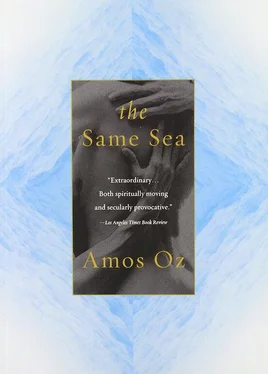in a vineyard, a lodge in a garden, a slice of barley bread and well water.
You are from there. You have lost your way.
Here is exile. Your death will come, and lay a knowing hand on your shoulder.
Come, its time to go home.
There is a village in a valley. Twenty flat-roofed huts. Mountain light,
sharp and intense. In a bend in the stream the six climbers, mostly Dutchmen,
are sprawled on a groundsheet, playing cards. Paul cheats a little, and Rico,
who is out, retires, swaddled in anorak and scarf, slowly inhaling
the crisp mountain air. He lifts up his eyes: sharp sickle peaks.
A couple of cirrus clouds. A redundant midday moon.
And if you lose your footing, the chasm has a womblike smell.
His knee aches and the sea is calling.
Stavros Evangelides, an eighty-year-old Greek wearing a crumpled brown suit
with a stain above the left: knee, has a bald brown head patterned with wrinkles,
moles and grey bristles, and a prominent nose, but perfect, young teeth,
and large, joyful eyes: guileless eyes, which seem to see only good. His room
is shabby. The curtains are faded. There's a crooked wooden shutter
secured on the inside with a bar. And a thick blend
of sepia smells heavily overlaid with incense. The walls are covered
with icons, and an oil lamp illuminates a Crucifixion with a very young
Christ, as though the painter has brought Golgotha forward,
so that the miracle of the loaves and the fishes, and the raising of Lazarus
must have occurred after the Resurrection. Mr. Evangelides is
a slow man. He seats his visitor, goes out and comes back twice,
the second time bringing a glass of water
lukewarm. First he collects his fee, in cash, counting the money methodically,
and enquires politely who it was in fact
who recommended the gentleman to him. His Hebrew is simple but correct,
with a slight Arab accent. Are his perfect teeth his own?
Impossible to tell for the moment. Then he asks a few general questions
about life, health and so on. He takes an interest
in Albert's family and country of origin. He maintains that the Balkans belong
both to the west and to the east. He writes all the answers down in detail
in a notebook. He wants to know about those who have gone before,
who and how and when. And who is the deceased who has brought you here
this evening, sir? Then he ponders. Digests. Studies his fingers
for a while, as though mentally checking to make sure they are all present
and correct. He explains modestly that he cannot guarantee
results. A man and a woman, you must surely know, sir,
are a mysterious union: one day they are close, the next
they turn their backs. I must ask you to breathe normally, sir.
Palms up. Clear your mind. That's right. Now we can begin.
The visitor closes his eyes to remember. Narimi narimi the bird said to her.
Then he reopens them. The room is empty.
The light is grey-brown. For a moment he fancies he can make out
an embroidered pattern in the folds of the curtains.
Some time later Mr. Evangelides came back into the room. Tactfully
he refrained from asking how it went. He brought
another glass of water, this time cool and fresh. A pleasant, soothing light
shone from his smiling eyes between the brown wrinkles, the smile
of a bright child displaying milk-white teeth. Treading softly
he saw his visitor to the door. The following day over herbal tea at the office
Bettine said to him, Albert, don't take it to heart, one way or another
almost everybody ends up disappointed. That's the way it is.
He was in no hurry to reply. For some time he studied
his fingers. After I left, he said, just like that in the middle of the street
I saw someone who looked a bit like her. From behind.
Bettine sits alone at home after midnight in an armchair reading a novel
about loneliness and wrongdoing. Someone, a secondary character, dies
because of a misdiagnosis. She lays the book
face down in her lap, and thinks about Albert: Why
did I send him to the Greek? I caused him unnecessary pain. And yet
we have nothing to lose, after all. He is living all by himself now,
and I am on my own too. You can hear the sea out there.
Vague rumors abound, and half-testimonies too, concerning a gigantic,
almost human creature, that roams alone in the Tibetan mountains.
Single and free. Footprints have been photographed in the snow
once or twice in inaccessible places where even the most intrepid
mountaineer would hardly dare venture. Almost certainly
it is nothing but a local legend. Like the Loch Ness monster
or the ancient Cyclops. His mother, who sat embroidering
almost to the hour of her death, his sad, withdrawn father
who sits night after night at his computer looking for loopholes
in the tax laws, everyone in fact, is condemned to wait
for their own death locked in a separate cage. You too, with your travelling,
your obsession to go further and further away and hoard more
and more experiences, are carting your own cage around with you
to the outer edge of the zoo. Everyone has their own captivity. The bars
separate everyone from everyone else. If that solitary snowman really exists,
without sex or partner, without birth or progeny or death,
roaming these mountains for a thousand years,
light and naked, how it must laugh as it moves among the cages.
Before excuse me is this seat taken,
before the color of your eyes, before can I get you a drink,
before I'm Rico I'm Dita, before the fleeting touch
of a hand on a shoulder, it passed through us both
like a door opening a crack in your sleep.
On the roof her shadow, a slow shadow,
a shadow that is gradually leaving me.
Indoors it is bad. Outside
it is dark. The bedroom at night
feels lower.
Butterflies to a tortoise
At sixteen and a half, in a country town, she was married to a well-off relative.
A widower aged thirty. It was the custom
to marry daughters within the family. Her father
was a gold and silver smith. One of the brothers was sent to Sofia,
to study to be a pharmacist and bring back a diploma. Nadia herself
learned from her mother how to cook and embroider,
make sweetmeats and write neatly. The widowed bridegroom, a draper,
came to visit on Sabbaths and holidays. If asked, he sang wonderfully
in a rich, resonant tenor voice. He was a tall, elegant, well-mannered man,
who always knew what to say
and what to pass over in silence. Nadia's heart
was not in the marriage, because her best friend whispered to her
what love was really like: it must not be stirred until it pleases.
But her parents, patiently, understanding, brought her to another point
of view. Surely to do her duty was also in her own best interest. And they set
a date, not too soon; they wanted to give her enough time
to become accustomed gradually to the widower, who never failed
to bring her a present Sabbath by Sabbath
she learned to like the sound of his voice. Which was pleasant.
After the wedding her husband turned out to be a considerate man
who inclined to a measure of regularity in intimate matters. Every evening,
Читать дальше












